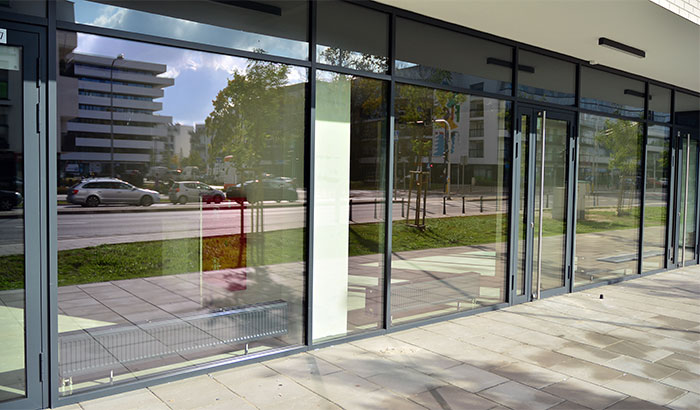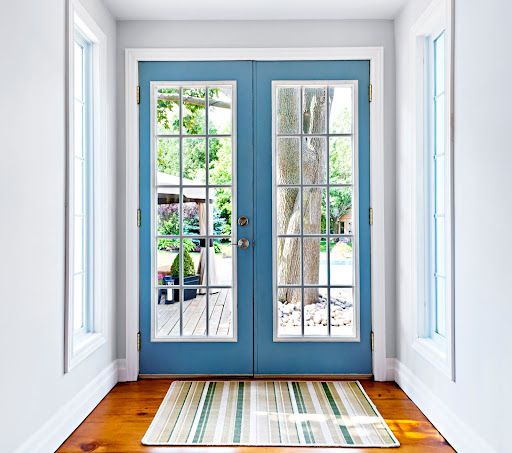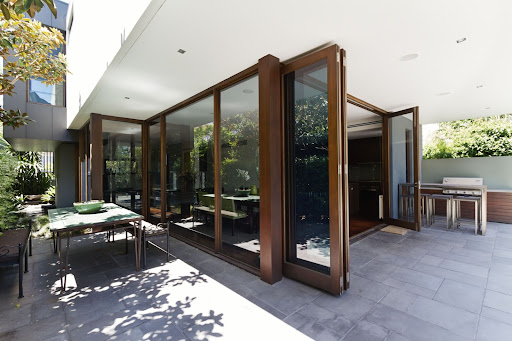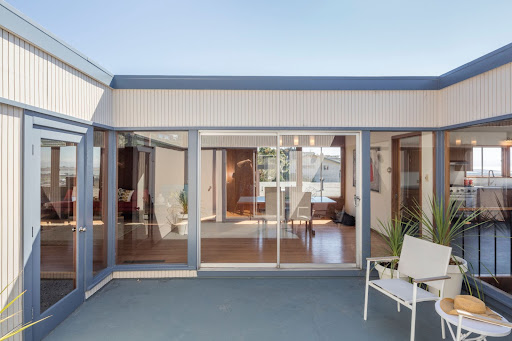
Glass doors have become popular in modern architecture, with their sleek and elegant design capturing the attention of homeowners and businesses alike. While the aesthetic appeal of glass doors is widely recognized, several lesser-known benefits make them an even more compelling choice.
Beneath their transparent surface, glass doors hold secrets that can remarkably transform your living or working space. From harnessing natural light to enhancing energy efficiency, these doors offer benefits that go beyond mere aesthetics. So, let’s dive into the world of glass doors and uncover the advantages you may not have known about.
1. Natural Light
Natural light has a transformative effect on any space, creating an atmosphere that is both inviting and uplifting. It has been scientifically proven that exposure to natural light positively affects our mood, productivity, and overall well-being. By incorporating glass doors into your home or office, you can harness the power of sunlight and bring its numerous benefits indoors.
Glass doors act as conduits for natural light, allowing it to flow seamlessly into your living or working space. Unlike solid doors, glass doors provide unobstructed views and transmit sunlight effortlessly, bathing the area in a soft, warm glow. The transparency of glass also enables light to penetrate deeper into the room, brightening even the darkest corners.
The presence of natural light profoundly impacts our emotional state and mental well-being. Sunlight stimulates the production of serotonin, a neurotransmitter responsible for regulating mood and promoting feelings of happiness. In turn, this can boost your productivity, creativity, and overall sense of satisfaction in both personal and professional pursuits.
Moreover, exposure to natural light has been shown to regulate our circadian rhythms, the internal clock that influences our sleep-wake cycle. By allowing natural light to filter through glass doors during the day, you can improve your sleep quality and maintain a healthy sleep schedule.
Beyond the psychological and physiological benefits, glass doors can also contribute to energy savings. By harnessing natural light, you can reduce your reliance on artificial lighting during the day, lowering energy consumption and decreasing electricity bills.
2. Energy Efficiency
Regarding energy efficiency, glass doors have come a long way. They now incorporate advanced technologies and features that help regulate indoor temperatures and reduce energy consumption. Understanding these energy-efficient components can help you make informed decisions when choosing glass doors for your space.
One of the key elements that enhance the energy efficiency of glass doors is the application of low-emissivity (low-E) coatings. These thin, virtually invisible layers are applied to the glass surface, helping to minimize heat transfer.
Low-E coatings reflect a significant portion of the sun’s infrared and ultraviolet rays, preventing excessive heat gain in the summer and heat loss in the winter.
In addition to low-E coatings, insulated glass units (IGUs) are crucial in improving energy efficiency. IGUs consist of two or more glass panes separated by an insulating spacer and sealed to create an airtight unit.
The space between the glass panes is often filled with insulating gas, such as argon or krypton, further reducing heat transfer. This insulation helps maintain comfortable indoor temperatures and reduces the load on heating and cooling systems.
By incorporating low-E coatings and insulated glass, glass doors effectively reduce the transfer of heat between the interior and exterior environments. During hot summer months, the low-E coatings reflect a significant portion of the sun’s heat back outside, keeping the indoor space cooler and reducing the need for excessive air conditioning.
In colder seasons, the insulating properties of glass doors with IGUs help prevent heat loss from the interior, maintaining a warmer and more comfortable environment. By reducing the reliance on heating systems, glass doors contribute to energy conservation and further decrease energy costs.
Energy-efficient glass doors benefit your wallet and the planet. By conserving energy, you actively contribute to reducing greenhouse gas emissions and minimizing your carbon footprint. Choosing energy-efficient options aligns with sustainable practices and demonstrates a commitment to environmental stewardship.
The long-term cost-effectiveness of energy-efficient glass doors is also worth noting. While they may require a slightly higher initial investment, the energy savings over time can offset the initial costs. Additionally, many governments and organizations offer incentives, such as tax credits or rebates, for adopting energy-efficient measures, including energy-efficient doors.
3. Visual Appeal
Glass doors have a remarkable ability to elevate the visual appeal of any space. Their sleek and transparent nature adds a touch of elegance and sophistication that is hard to replicate with other door materials. You can instantly transform a mundane entrance into a stunning focal point by incorporating glass doors into your design.
The inherent beauty of glass doors lies in their ability to create a sense of openness and lightness. The transparency of glass allows for the seamless flow of light, making spaces feel brighter and more inviting.
One of the remarkable aspects of glass doors is their versatility. They can be seamlessly integrated into various architectural styles, from modern and minimalist to classic and traditional. Whether your space boasts clean lines, contemporary aesthetics, ornate details, or historical charm, glass doors can be customized to complement and enhance the existing design.
Glass doors offer a range of options in terms of frame materials, finishes, and decorative elements. You can choose the perfect frame material that aligns with your desired aesthetic, from sleek aluminum frames to warm wooden frames. Additionally, you can select from a variety of finishes, such as clear, frosted, or tinted glass, to achieve the desired level of privacy and style.
Glass doors are uniquely able to seamlessly integrate into different design schemes, making them a versatile choice for any space. The transparency of glass allows for uninterrupted sightlines, creating a sense of continuity between rooms or between indoor and outdoor areas. This integration not only enhances the visual appeal but also improves the functionality and flow of the space.
Glass doors can be used in various applications, such as room dividers, patio or garden entrances, shower enclosures, or even as striking storefronts. Their adaptability and ability to blend with diverse design schemes make them popular among architects, interior designers, and homeowners seeking a timeless and sophisticated look.
4. Space Optimization
Unlike traditional doors that can be visually restrictive, glass doors allow for unobstructed views, making a space feel larger and more expansive than it actually is. This makes them an excellent choice for both small and large areas, where space optimization is a priority.
The transparency of glass doors creates an illusion of a seamless transition between rooms or between indoor and outdoor areas. By removing physical barriers and replacing them with glass, you can visually connect different areas of your space. This openness fosters a feeling of expansiveness, making the entire area feel more inviting and spacious.
Glass doors play a crucial role in extending sightlines within a space. By allowing unobstructed views, they enhance spatial connectivity, making navigating and interacting with different areas of a room or property easier. This is particularly beneficial in residential settings, where glass doors can connect living spaces to outdoor patios or gardens, blurring the boundary between the indoors and outdoors.
In commercial settings, glass doors can create an open and collaborative environment by visually connecting various work areas or conference rooms. This promotes better communication and a sense of unity among team members.
Glass doors offer practical applications in various settings. In residential spaces, they can be used as room dividers to create flexible living areas.
Separating rooms with glass doors allows you to maintain an open feel while providing the option for privacy when needed. They are also commonly used as patio or garden entrances, allowing for seamless transitions between indoor and outdoor living spaces.
In commercial settings, glass doors are often used in offices, restaurants, and retail spaces to create an inviting entrance and showcase products or services. Glass storefronts attract customers and provide a transparent and welcoming atmosphere.
Overall, glass doors’ space optimization benefits extend to residential and commercial environments. They create a sense of openness, extend sightlines, and enhance spatial connectivity. Whether you’re looking to maximize the perceived size of a room or foster a collaborative work environment, glass doors offer practical solutions for optimizing space.
5. Easy Maintenance
One of the often-overlooked benefits of glass doors is their easy maintenance. Cleaning and maintaining glass doors doesn’t have to be a laborious task. With the right cleaning solutions and techniques, you can keep your glass doors looking sparkling clean and clear without much effort.
You don’t need fancy or specialized cleaning products to clean glass doors effectively. Simple household items can do the job just fine. Start by mixing a mild dish soap or vinegar solution with warm water in a spray bottle. This gentle solution is ideal for removing dirt, dust, and smudges without causing any damage to the glass or the surrounding frames.
Regarding cleaning techniques, a soft, lint-free cloth or microfiber cloth is your best ally. To avoid excess moisture, spray the cleaning solution onto the cloth, not directly onto the glass. Then, gently wipe the glass surface in a circular or vertical motion, focusing on any areas with visible marks or fingerprints.
Regular dusting is key to maintaining the cleanliness and clarity of glass doors. Use a dry, lint-free cloth or a feather duster to remove any loose dust particles from the surface of the glass. This simple step can help prevent the buildup of dirt and grime.
The mild soap or vinegar solution mentioned earlier will work wonders for fingerprints and smudges. Spray a small amount onto the cloth and gently wipe the affected areas until they are clean and streak-free. Remember to dry the glass with a clean cloth to prevent water spots.
To ensure the long-term durability of your glass doors, it’s important to follow a few maintenance tips:
- Avoid using abrasive or harsh cleaners, which can scratch or damage the glass surface. Stick to mild cleaning solutions to protect the integrity of the glass.
- Regularly inspect and clean the tracks and rollers of sliding glass doors. Remove any dirt or debris that may hinder smooth operation.
- Check the weatherstripping around the edges of the glass doors. Replace any worn-out or damaged weatherstripping to maintain proper insulation and prevent air leaks.
- Be mindful of the hardware, such as handles and hinges. Clean them regularly and tighten any loose screws to ensure the proper functioning of the doors.
6. Sound Insulation
While glass is often associated with being a poor sound insulator, modern glass doors have made significant advancements in terms of sound insulation.
It’s important to debunk the misconception that all glass doors allow sound to pass through easily. With the right construction and materials, glass doors can provide effective sound insulation, contributing to a quieter and more peaceful environment.
Modern glass doors are designed with acoustic properties in mind. They are engineered to minimize sound transmission and dampen noise, allowing for a more serene living or working space. The construction of these doors includes various components that work together to reduce the transfer of sound waves.
The use of double or triple-glazed glass is one of the key elements that contribute to sound insulation in glass doors. These types of glass consist of multiple glass panes with an air- or gas-filled space in between. The additional layers as a barrier, reducing sound vibrations and preventing them from easily passing through.
The thickness of the glass and the spacing between the panes are carefully calculated to effectively block and absorb sound waves at different frequencies. This helps to minimize external noise, such as traffic or nearby construction, and creates a more peaceful indoor environment.
The sound insulation provided by glass doors significantly benefits both residential and commercial spaces.
In residential settings, glass doors with sound insulation help create a peaceful sanctuary, minimizing external noise intrusion and promoting a calm atmosphere. This is especially valuable for bedrooms, home offices, or any areas where a quiet environment is desired.
Sound insulation in glass doors is crucial for maintaining privacy and minimizing distractions in commercial settings, such as offices, conference rooms, or healthcare facilities. It ensures that confidential conversations remain confidential and allows for focused work or patient confidentiality.
By investing in glass doors with sound insulation, you can create a more serene and comfortable environment, free from the disturbances of external noise. This can significantly enhance your quality of life and improve productivity and concentration in both residential and commercial settings.
7. Enhanced Security
Modern glass doors come equipped with a range of features that enhance their security. These doors are designed to provide reliable protection without compromising their aesthetic appeal.
To enhance security, glass doors can be constructed using reinforced or laminated glass. Reinforced glass is made by incorporating a layer of toughened glass, which undergoes a specialized heating and cooling process. This process strengthens the glass, making it more resistant to impact and breakage.
On the other hand, laminated glass consists of multiple layers of glass with a polymer interlayer in between. This interlayer holds the glass together even if it breaks, providing an added layer of protection.
By using reinforced or laminated glass, glass doors become more resistant to forced entry attempts, increasing the security level of your property.
Glass doors are not just about the glass itself; the locking systems and security options also play a crucial role. Many glass doors are equipped with robust locking mechanisms, such as multipoint locks, deadbolts, or smart locks, which provide superior protection against unauthorized access. These advanced locking systems offer enhanced security and peace of mind.
Other security options, such as security film or shatter-resistant coatings, can be applied to the glass surface. These additions provide an extra layer of protection by making it more difficult for intruders to break through the glass, further enhancing the security of your space.
While security is paramount, it doesn’t mean you have to compromise on aesthetics. Glass doors offer a harmonious balance between safety and visual appeal. The transparent nature of glass allows you to showcase the beauty of your surroundings while ensuring that security is not compromised.
With a wide variety of frame options, finishes, and decorative elements available, you can choose a glass door that complements your design scheme without sacrificing safety. Whether you prefer a modern, sleek look or a more traditional and ornate style, there are glass doors available to suit your preferences.
Investing in glass doors that prioritize both security and aesthetics allows you to create a space that looks inviting and provides a high level of protection for you and your property.
8. Customization Options
One of the lesser-known benefits of glass doors is the vast array of customization options available. From glass types to frames, finishes, and decorative elements, there is a customization option to suit every individual’s taste and style. This allows you to create a truly unique and personalized look for your space.
When it comes to customization, the choices are endless. Starting with the glass itself, you can choose from clear, frosted, tinted, or patterned glass, depending on the level of privacy or aesthetic effect you desire. Each glass type offers a distinct look and feel, allowing you to achieve the desired ambiance in your space.
Frames also play a crucial role in customization. You can select from various materials, such as aluminum, wood, or steel, each offering its unique characteristics and style. The finish of the frames can be tailored to match your interior or exterior design scheme, whether it’s a sleek metallic finish, a warm wooden tone, or a vibrant color.
Moreover, decorative elements like etched patterns, stained glass inserts, or custom designs can be added to further personalize your glass doors. These elements can reflect your personal style, showcase your brand identity in a commercial setting, or add artistic flair to any space.
Customization allows you to personalize your glass doors to match your individual preferences. Whether you prefer a minimalist and contemporary look or a more ornate and traditional style, there are customization options available to bring your vision to life.
Customized glass doors can seamlessly blend with the existing architectural style of your space or become a striking focal point that adds character and charm.
Opting for customized glass doors allows you to add a unique touch to any space. Whether it’s a residential home, an office, a retail store, or a hospitality venue, customized glass doors can set your space apart and create a lasting impression.
The ability to tailor the design and aesthetics of your glass doors ensures that they perfectly align with your vision and create a cohesive and visually appealing environment.
Customization options not only allow you to express your personal style and preferences but also enable you to create a space that stands out from the crowd. Whether you desire a bold statement piece or a subtle and elegant addition, customized glass doors offer the flexibility to transform any space into a truly distinctive and captivating setting.
9. Health and Well-being
In addition to the previously discussed benefits, glass doors also contribute to our overall health and well-being. The design and features of glass doors can positively impact our physical and mental health, creating a space that promotes a sense of vitality and positivity.
One of the key ways that glass doors improve our well-being is through exposure to natural light. Natural light has been proven to have numerous benefits for our health. It helps regulate our circadian rhythm, which affects our sleep patterns and overall energy levels. Exposure to natural light during the day also promotes the production of serotonin, a neurotransmitter associated with improved mood and happiness.
By incorporating glass doors into our living or working spaces, we allow abundant influx of natural light, filling the interior with a warm and inviting glow. This not only creates a visually appealing atmosphere but also boosts our well-being by providing us with the essential vitamin D and a connection to the natural world outside.
Glass doors serve as a bridge between our indoor spaces and the outdoor world. They offer a visual connection to nature, allowing us to feel more connected to the outside environment. This connection to nature has been shown to reduce stress levels, improve cognitive function, and enhance our overall well-being.
Whether it’s a stunning view of a garden, a serene landscape, or a bustling cityscape, glass doors enable us to enjoy the beauty of our surroundings from the comfort of our own space. This connection to nature can be particularly beneficial for those who spend long hours indoors or for individuals in urban environments where green spaces may be limited.
Glass doors can transform our living or working environment into a harmonious and uplifting space. The abundance of natural light, the visual connection to nature, and the sense of openness created by glass doors contribute to a positive and invigorating atmosphere.
Studies have shown that exposure to natural light can improve productivity, concentration, and overall cognitive function. By incorporating glass doors into our workspaces, we can create an environment that supports our mental clarity and focus, ultimately boosting our performance and well-being.
In residential settings, glass doors can enhance the overall ambiance of a space, creating a welcoming and cheerful atmosphere. They allow daylight to permeate through different areas of the house, illuminating rooms and making them feel more spacious and inviting.
By embracing the benefits of glass doors and prioritizing our connection to nature and exposure to natural light, we can cultivate a space that nurtures our health and well-being. Whether it’s in our homes, offices, or any other environment, glass doors play a vital role in creating an uplifting and revitalizing atmosphere.
10. Sustainability
In an era where environmental consciousness is becoming increasingly important, it’s essential to consider the sustainability aspect of the materials we use in our living spaces. Glass doors offer notable sustainability benefits that make them eco-friendly for homeowners and businesses alike.
Glass is highly recyclable, which means that glass doors have a minimal environmental impact compared to other materials. When glass doors reach the end of their lifespan, they can be recycled and repurposed, reducing the need for new raw materials and minimizing waste.
By choosing glass doors, you contribute to the circular economy, where materials are kept in use for as long as possible, reducing the strain on natural resources and lowering greenhouse gas emissions associated with the production of new materials.
Glass doors are known for their durability and longevity. With proper care and maintenance, they can withstand the test of time, reducing the need for frequent replacements. This longevity translates into less waste and a reduced environmental footprint.
Furthermore, glass doors offer energy-saving features that contribute to sustainability. As mentioned earlier, glass doors facilitate the entry of natural light, reducing the need for artificial lighting during the day. This, in turn, leads to lower energy consumption and decreased reliance on electricity, resulting in reduced greenhouse gas emissions.
Additionally, the energy-efficient properties of glass, such as low-emissivity coatings and insulated glass, contribute to better thermal insulation. Glass doors with these features help maintain a comfortable indoor temperature, reducing the need for excessive heating or cooling and further lowering energy consumption and associated carbon emissions.
By incorporating glass doors into your living or working spaces, you are actively participating in a more eco-friendly lifestyle. Glass doors’ sustainable features align with environmental responsibility principles and contribute to a healthier planet.
Choosing glass doors demonstrates your commitment to sustainable practices and sets an example for others to follow. Investing in eco-friendly solutions encourages the adoption of more sustainable materials and contributes to a greener future.
Valley Glass Does Doors and More
At Valley Glass, we treat every project with a degree of personal attention and expertise that simply can’t be rivaled. We’ve been a part of the Utah community since 1956, and have worked hard to establish excellence in glass replacement and repair.
Our commitment to a job well done has remained strong over the decades. We handle everything from exterior door installation to auto glass repair with precision and professionalism, so you can rest assured that your new glass installation or replacement project is in good hands. Contact Valley Glass today to see how we can help.





Leave a Reply